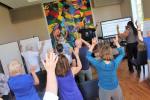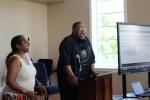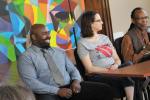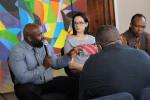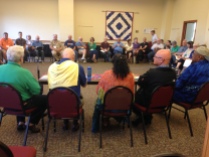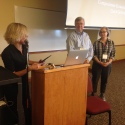You also must be ready, for the Son of Man is coming at an unexpected hour.
— Luke 12:40
This Sunday’s Gospel is one of many in the Synoptic Gospels with an apocalyptic feel to it, ringing out a sense of urgency. We are warned to “be ready”; “be dressed for action and have your lamps lit”; your master may come “during the middle of the night,” like ‘the thief breaking into your house.’ Why such a sense of urgency?
One answer has been to suggest that the early church, if not Jesus himself, expected the “second coming” of Christ to come soon, ushering in the climactic moment of God’s reign. And so, two thousand years later, we conclude that they were wrong. That hasn’t happened yet. But neither has it slowed down the predictions that the second coming is just around the corner — divining cryptic signs from books of the Bible like Daniel and Revelation to warn us of coming rapture.
More common in Christian circles has been to reinterpret this urgency in terms of the ‘moment of truth’ when each person dies — which could come at any moment, so one needs to be ready. Christ will come to you at that moment to judge if you were faithful. So you need to turn your life over to Jesus Christ in faith now, in order that you may be certain to go to heaven upon that sudden arrival of your death. The alternative is eternal torture in hell — which definitely does compel a sense of urgency!
The most recent generation of scholars, led by N.T. Wright, are suggesting another way of reading these passages — one I believe to be more faithful to Jesus’ message and ministry. Jesus, if not the early church, was talking about the sudden arrival of God in the world through the unexpected death and resurrection of God’s Messiah. The Messiah was about to bring the inauguration of God’s way of peace into the world. Luke’s Jesus puts the urgency involved most poignantly upon his arrival to Jerusalem, weeping over the city, and saying,
“If you, even you, had only recognized on this day the things that make for peace! But now they are hidden from your eyes. Indeed, the days will come upon you, when your enemies will set up ramparts around you and surround you, and hem you in on every side. They will crush you to the ground, you and your children within you, and they will not leave within you one stone upon another; because you did not recognize the time of your visitation from God.” (Luke 19:42-44)
“This day.” The Son of Man was arriving right then and there for the climactic moment, and his people, including the disciples, were clueless. The urgency involved recognizing the about-to-happen “visitation from God” with the true way of peace. And the consequences of not recognizing it would be the next round of world-changing violence — in this particular instance, the destruction of Jerusalem by the Romans in 70 CE, forever altering the Jewish way of life.
This places Jesus much more in line with the prophets like Isaiah, whose prophecies were about a similar urgency for repenting and trusting in God’s way of peace to avoid the next round of world-changing violence (“world” not necessarily in the sense of global but in the sense of their world, their way of life) — in that instance, things like destruction and exile at the hands of the Babylonians. Mark sets the tone in the Synoptic Gospels by using the call of Isaiah as a guiding metaphor, quoting the part about God’s people having eyes unseeing and ears unhearing when explaining the use of parables (Mark 4:12, referencing Isa. 6:9-10), and then structuring much of his Gospel around Jesus trying to heal deafness and blindness, calling would-be disciples to “Listen!” and “Watch!” And the reader of Isaiah keeps in mind what comes next, after the quoted verses:
Then I said, “How long, O Lord?” And he said: “Until cities lie waste without inhabitant, and houses without people, and the land is utterly desolate; until the LORD sends everyone far away, and vast is the emptiness in the midst of the land. Even if a tenth part remain in it, it will be burned again, like a terebinth or an oak whose stump remains standing when it is felled.” The holy seed is its stump. (Isa. 6:11-13)
2700 years after Isaiah and 2000 years after the coming of the Son of Man, how many times has this prophecy come true? How many times have human beings laid waste to our cities, “because you did not recognize the time of your visitation from God”? How many more times must it come true before we see and listen?
And, most importantly, what are the current realities we face which threaten the next round of world-changing violence, and thus an urgency of response by disciples of Jesus to live God’s way of peace?
There are many answers to choose from, unfortunately, but I’m going to suggest one: take on the formidable power of racism that has plagued our Euro-American culture for 400 years. It is at the root of so many of our problems, including terrorism. Recent events point to the possibility of our cities being laid waste again, like many of them in the late 1960’s, and it could be worse this time around. And the solution must go beyond white people calling for people of color not to resort to violence — which is highly convenient for us to do, since we don’t have to directly suffer the violence of racist systems that continue to oppress people of color (though we white folks might wake up to the indirect suffering the evil of racism causes us, too). The only solution that will move us forward is for white people to get serious about recognizing the enormity of the 400 year-old monster of racism. Jesus is issuing an urgent call for us to act, to bear fruit (or be cut down like the unfruitful fig tree — cut down by our own violence), to respond to the coming of God’s way of peace into the world by being peacemakers ourselves, true children of God (Matt. 5:9).
What can we do — especially us white people? I will suggest several steps:
- Read and learn more about racism. This is more important than you might think, because the talk about racism in the media is so largely uninformed. Two books that I find particularly enlightening for today’s challenges are: Michelle Alexander’s The New Jim Crow: Mass Incarceration in the Age of Colorblindness; and Kelly Brown Douglas’s Stand Your Ground: Black Bodies and the Justice of God. The latter gives extremely helpful insight into how our present challenges have a 400-year history of racism becoming deeply embedded in our culture.
- Reach out and build relationships across ‘color-lines.’ This is necessary on many fronts, but it is especially helpful for white people to be open to, and to ask for, help on seeing what we typically cannot see. Don’t know what “white privilege” is? Ask a friend of color, and s/he will be able to tell you.
- At the same time, building relationships across color-lines is only the start. It can never bring about by itself the systemic change that needs to happen. For a more immediate explanation on why this is the case, see my recent sermon, “Exposing and Working to Heal the Sin of Racism.”
- Most importantly, my highest recommendation is to seek antiracism training for the institutions and systems that you inhabit. There is nothing quite like the training offered by Crossroads Antiracism Organizing and Training (producers of the video used in my sermon). I urge you to contact them today! “You also must be ready…” The time to respond is now.











